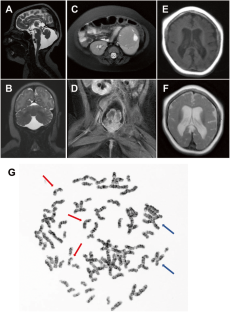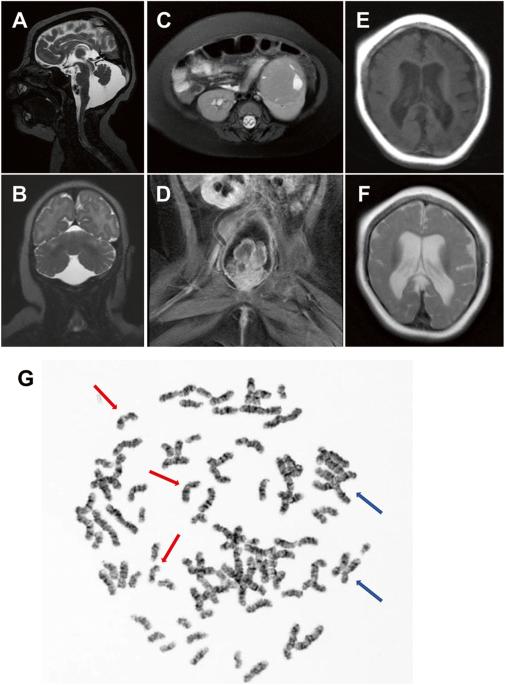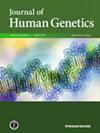核糖核酸测序和目标长读数测序揭示了导致剪接异常的内含子转座子插入
IF 2.6
3区 生物学
Q2 GENETICS & HEREDITY
引用次数: 0
摘要
半数以上的疑似遗传性疾病病例仍无法通过外显子组测序(ES)和基因组测序(GS)等短线程测序方法进行基因分析。RNA 测序(RNA-seq)和长线程测序(LRS)分别有助于解读候选变异和检测含有重复序列的结构变异。最近,纳米孔测序仪上的自适应采样技术使目标 LRS 更容易实现。在这里,我们介绍了一名患有早幼染色体分离(PCS)/马赛克变异非整倍体(MVA)综合征的日本女孩。ES 在 BUB1B(NM_001211.6)内含子 10(c.1402-5A>G)中检测到一个已知的致病母体杂合变体(c.1402-5A>G),BUB1B 是 PCS/MVA 综合征的已知反应基因,具有常染色体隐性遗传性。微型基因剪接检测显示,c.1402-5G 等位基因的几乎所有转录本都有 4-bp 插入的错误剪接。GS无法检测到其他致病变异,而RNA-seq则在内含子2中发现了异常读数。为了广泛探究内含子 2 中的变异,我们进行了适应性取样,并确定了父系的 3.0 kb 插入。跨越该插入片段的 16 个读数的共识序列显示,该插入片段由 Alu 和 SVA 元件组成。将RNA-seq读数与包含插入片段的新参考序列重新配准后发现,16个读数的5'剪接位点位于插入片段内,3'剪接位点位于外显子3,这表明插入片段与异常剪接之间存在因果关系。此外,免疫印迹显示患者衍生细胞中的 BUB1B 蛋白水平严重下降。这些数据表明,通过 RNA-seq 检测转录组异常可作为确定致病变体的线索,而确定插入序列是 LRS 的优点之一。本文章由计算机程序翻译,如有差异,请以英文原文为准。


RNA sequencing and target long-read sequencing reveal an intronic transposon insertion causing aberrant splicing
More than half of cases with suspected genetic disorders remain unsolved by genetic analysis using short-read sequencing such as exome sequencing (ES) and genome sequencing (GS). RNA sequencing (RNA-seq) and long-read sequencing (LRS) are useful for interpretation of candidate variants and detection of structural variants containing repeat sequences, respectively. Recently, adaptive sampling on nanopore sequencers enables target LRS more easily. Here, we present a Japanese girl with premature chromatid separation (PCS)/mosaic variegated aneuploidy (MVA) syndrome. ES detected a known pathogenic maternal heterozygous variant (c.1402-5A>G) in intron 10 of BUB1B (NM_001211.6), a known responsive gene for PCS/MVA syndrome with autosomal recessive inheritance. Minigene splicing assay revealed that almost all transcripts from the c.1402-5G allele have mis-splicing with 4-bp insertion. GS could not detect another pathogenic variant, while RNA-seq revealed abnormal reads in intron 2. To extensively explore variants in intron 2, we performed adaptive sampling and identified a paternal 3.0 kb insertion. Consensus sequence of 16 reads spanning the insertion showed that the insertion consists of Alu and SVA elements. Realignment of RNA-seq reads to the new reference sequence containing the insertion revealed that 16 reads have 5’ splice site within the insertion and 3’ splice site at exon 3, demonstrating causal relationship between the insertion and aberrant splicing. In addition, immunoblotting showed severely diminished BUB1B protein level in patient derived cells. These data suggest that detection of transcriptomic abnormalities by RNA-seq can be a clue for identifying pathogenic variants, and determination of insert sequences is one of merits of LRS.
求助全文
通过发布文献求助,成功后即可免费获取论文全文。
去求助
来源期刊

Journal of Human Genetics
生物-遗传学
CiteScore
7.20
自引率
0.00%
发文量
101
审稿时长
4-8 weeks
期刊介绍:
The Journal of Human Genetics is an international journal publishing articles on human genetics, including medical genetics and human genome analysis. It covers all aspects of human genetics, including molecular genetics, clinical genetics, behavioral genetics, immunogenetics, pharmacogenomics, population genetics, functional genomics, epigenetics, genetic counseling and gene therapy.
Articles on the following areas are especially welcome: genetic factors of monogenic and complex disorders, genome-wide association studies, genetic epidemiology, cancer genetics, personal genomics, genotype-phenotype relationships and genome diversity.
 求助内容:
求助内容: 应助结果提醒方式:
应助结果提醒方式:


